The Dark Side of the INFJ Personality Type
INFJs have a bit of a cult following in the Myers-Briggs® world. If the types were Hogwarts houses, INFJs would be Ravenclaw-meets-Hufflepuff with a sprinkle of mysterious mentor energy. People call them “rare,” “empathic,” “visionary.” You’ve got Gandhi, Jung, and Tolstoy in your corner. No pressure, right?
But here’s the thing—being an INFJ doesn’t give you a free pass to sainthood. You can still fall into destructive patterns, snap at people, overthink until your brain is soup, and spiral into existential dread while pretending you’re totally fine (you’re not).

In this article, we’re flipping the spotlight. We’re not just talking about the INFJ’s magical intuition or their knack for reading a room. We’re digging into the shadowy corners: the unhealthy patterns, the emotional minefields, the behaviors you probably wish you didn’t relate to…but totally do.
And don’t worry—we’re not leaving you in the dark. By the end of this, you’ll have tools to pull yourself back from the edge of INFJ burnout, step into your strengths, and maybe even laugh a little at your own weirdness along the way.
(Oh, and if you’re still not 100% sure you’re an INFJ, scroll down for some personality test recommendations. No shame in needing a second opinion.)
Not sure what your personality type is? Try out our most highly recommended personality questionnaires:
- You can take our free personality questionnaire here
- You can take Personality Hacker’s personality questionnaire.
- You can take the official Myers-Briggs Type Indicator® for $49.95
This article contains an affiliate link to a questionnaire on Personality Hacker. If you purchase one of their courses, I get a small kickback that I can use to pay for hosting and other demands of this site. I only recommend courses I love.
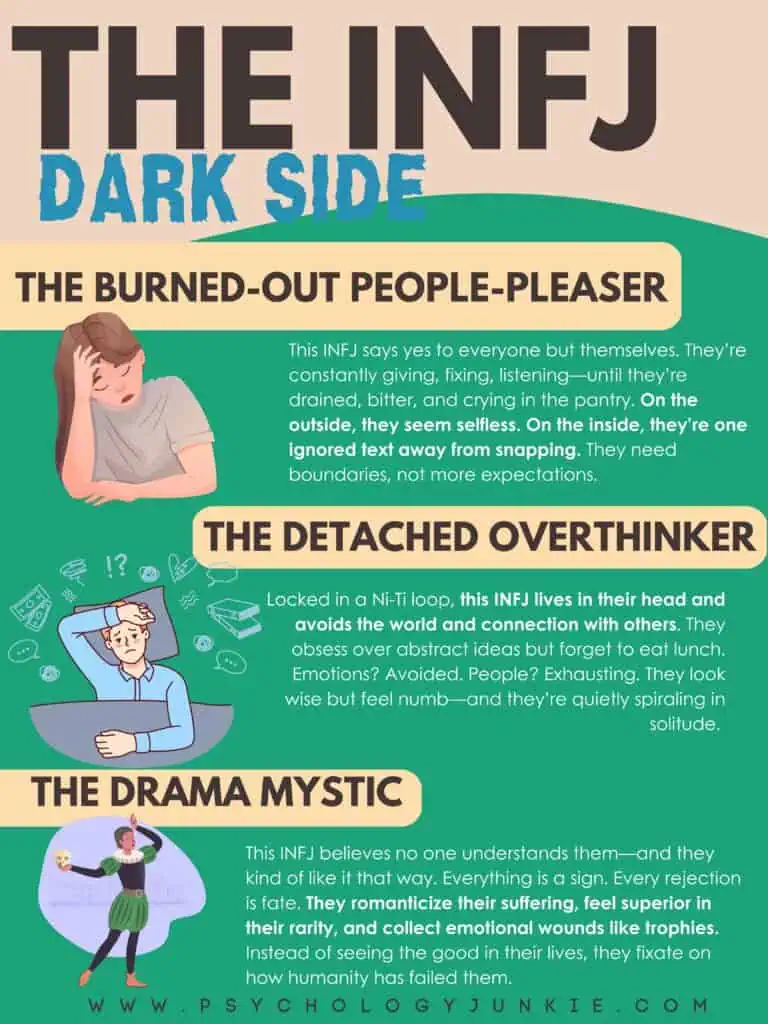
So…What Is an INFJ, Really?
INFJ stands for Introverted, Intuitive, Feeling, and Judging—a combination that reads like “quiet philosopher with a secret agenda to save the world.”
You’re introspective but people-focused, imaginative but structured, sensitive but stubborn in your convictions. If you’re an INFJ, you probably feel like an old soul in a loud, chaotic world that runs on caffeine and small talk.
Only about 2.3% of the U.S. population identifies as INFJ, which explains why you sometimes feel like you were dropped onto the wrong planet. (You weren’t. Probably.) You have big-picture visions, a deep need for connection, and a weird sixth sense for what people are really feeling—even when they’re trying really hard to hide it.
You notice things. You connect dots other people don’t even see. You might not always know how to explain your insights without sounding like a cryptic oracle, but you know stuff.
And while all of that sounds beautiful (and it is), it comes with a unique set of challenges. Because when life gets messy—and it always does—your gifts can twist into weapons. Empathy turns to martyrdom. Vision turns to paralysis. Insight turns into a sleepless 3 a.m. spiral where you rewrite conversations from five years ago.
Sound familiar?
Let’s go there.
The Many Ways the INFJ Dark Side Shows Up (Cue Dramatic Lighting)
Let’s be real—every type has a shadow side. Even super-friendly ESFJs can have a mean meltdown, and chill ISTPs can spontaneously combust if you mess with their autonomy.
So when does the dark side emerge for INFJs?
It’s not usually dramatic at first. You don’t wake up one day and go full villain monologue. It’s more like a slow unraveling. You’re stressed. You’re overbooked. You’re socially fried. You’ve been running on idealism and herbal tea, and then one more thing tips you over the edge, and suddenly you’re lashing out or zoning out or wondering if you should just quit everything and become a hermit in the woods. (Which honestly still sounds kind of appealing.)
Here are some of the usual suspects that push INFJs into their not-so-shiny selves:
- Chronic stress
- People overload (aka “peopled out”)
- Too much isolation (yes, even you need sunlight and human interaction sometimes)
- Feeling unappreciated or misunderstood
- Indecisiveness
- Sensory overload (hello, bright lights and screaming children)
- Trying to be everything for everyone
- Operating too far outside your strengths
You don’t have to tick all of these boxes to veer into unhealthy territory. Even just one or two can be enough to knock you off your center. And when that happens? Let’s just say the usual “calm, empathic INFJ” vibe takes a backseat to a more chaotic, stressed-out version that might look nothing like you on a good day.
The Stressed INFJ
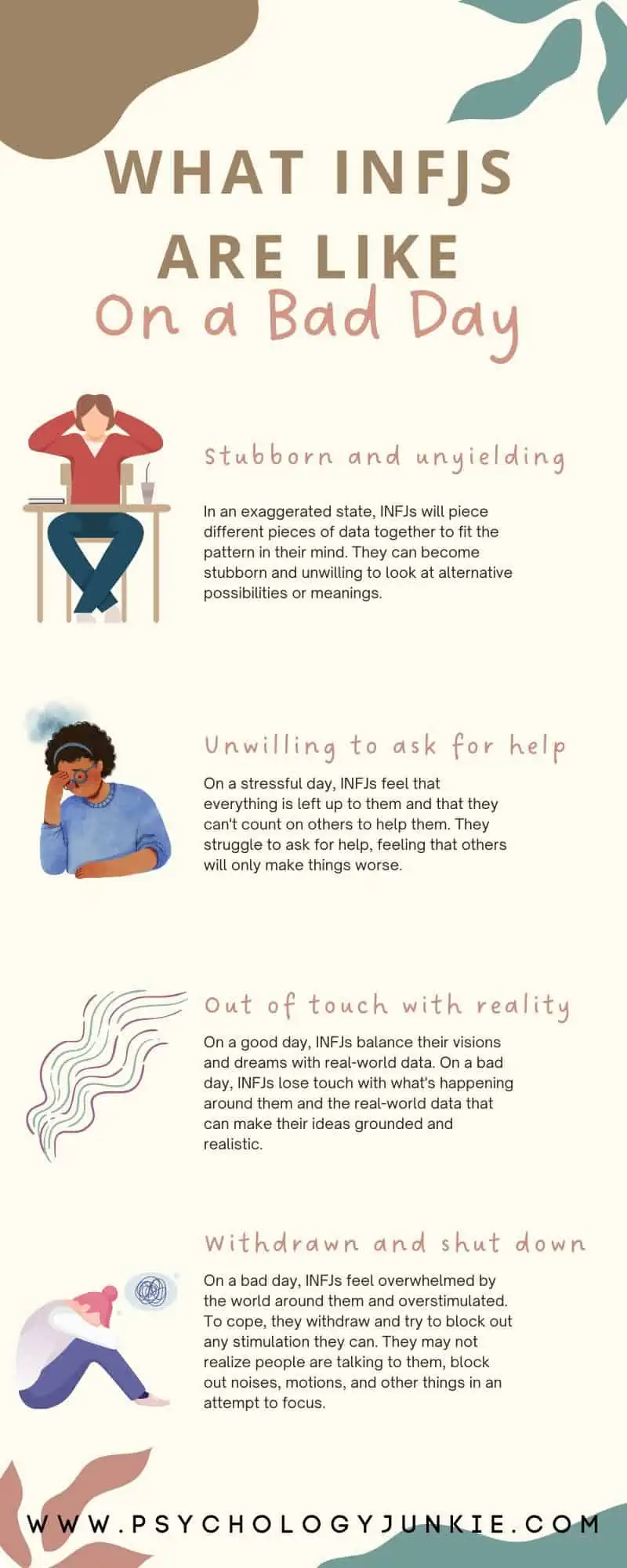
“Knowing your own darkness is the best method for dealing with the darknesses of other people.” – Carl Jung
Here’s the deal: INFJs aren’t stress-proof just because they read self-help books for fun and know how to “hold space” for someone sobbing over their oat milk latte. If anything, your tendency to absorb everyone else’s emotions makes you even more susceptible to imploding.
When stress hits, the INFJ’s first move is usually to retreat. You slip into your inner world, trying to figure things out. You pull out your metaphorical vision board and start plotting possible futures, analyzing patterns, searching for meaning in the mess.
That part? Totally on-brand. You’re like a more empathic, soft Dr. Strange.
But if the stress doesn’t stop—if life keeps pummeling you with deadlines, expectations, or emotional messiness—you can hit what’s known as grip stress. This is where things get weird. And loud.
INFJs under grip stress don’t act like INFJs. You go full opposite-mode and start channeling your inferior function: Extraverted Sensing (Se). Translation? You try to do your way out of stress instead of reflect your way through it.
You might:
- Overeat or binge on sugar (hello, girl scout cookies)
- Clean everything ferociously
- Blast music at eardrum-shattering levels
- Run five miles even though you hate running
- Spend hours doomscrolling or hyper-fixating on random sensory distractions
In short, you go from quietly overthinking to chaotically overstimulating yourself. It’s like your mind is trying to drown out the screaming inner monologue with anything physical or immediate. And if someone catches you mid-grip? You might snap. Not in a “hurl a chair across the room” kind of way (usually), but in a “judgmental comment that cuts a little too deep” or “unexpected tears during a Target run” kind of way.
It can feel like an out-of-body experience—like you’re watching yourself act unlike you and can’t stop it. And afterward? The shame spiral. The self-blame. The “what is wrong with me?” interrogation.
The truth is, nothing is wrong with you. You’re just maxed out. Your intuition’s gone offline. Your empathy’s in hiding. And your body’s waving a giant flag that says, “We need help.”
Let’s talk about how to find it.
Dealing with Stress:
Stress is unavoidable in life, and a little stress can even be a good thing. It can help us to grow, challenge ourselves, and mature. That said, if you’re experiencing excessive stress, or feel more anxious than peaceful most of the time, here are some things that can help – specifically if you’re an INFJ:
- See if there are any non-essential responsibilities you can cancel
- Get some time alone to recharge
- Turn off bright lights, loud sounds, put away your phone, turn off the television
- Close your eyes and practice deep breathing (inhale for five seconds and exhale for five)
- Visualize something that makes you feel peaceful or contented in your soul
- Get some physical exercise (go for a walk, practice yoga or tai chi)
- Talk to someone you trust and express your feelings
- Write down your emotions in a journal and read them back to yourself
- Check in with your body to see what it needs (rest, water, a healthy snack)
- Spend time in nature and take in every sensory detail
Conflict
(a.k.a. Please No One Be Mad at Me Ever, Thanks)
Conflict and INFJs go together like oil and water. Or introverts and open-plan offices.
You’re wired for harmony. You can sense tension in the air before anyone even says a word. You’d rather mediate a ceasefire between two angry cats than confront someone about how they hurt your feelings.
So what do you do when conflict shows up?
You withdraw. You get quiet. You run the entire conversation through a mental rehearsal 50 times, imagining how it might go wrong and deciding it’s probably not worth it. You tell yourself, “I’ll bring it up later,” and then never do.
Sometimes this works. A little space can help you process. A deep breath can keep you from saying something regrettable. You might even walk away feeling wise and mature. You are Yoda and the universe is your Dagobah…just less swampy.
But other times? That retreat becomes a habit. You swallow your needs, shove down your resentment, and convince yourself you’re being “the bigger person.” Meanwhile, your frustration festers, and suddenly you’re snapping at someone for breathing too loudly because you never addressed the real issue to begin with.
Avoiding conflict might feel safe in the moment, but over time it can lead to:
- Bottled-up resentment
- Burnout from people-pleasing
- Passive-aggressive comments that even you didn’t see coming
- Feeling like a ghost in your own relationships
INFJs, listen—your needs matter too. You’re not a cosmic therapist put on this Earth solely to make sure everyone else is okay while you slowly disintegrate.
So yes, conflict is awkward. It’s messy. It can be deeply uncomfortable. But it can also be a doorway to deeper connection, clearer boundaries, and way less passive-aggressive dishwashing.
We’ll dig into how to handle conflict well in the “How to Grow” section, but for now just know this: You don’t have to sacrifice your peace of mind to keep the peace.
Too Much Socializing
(a.k.a. The People Hangover)
Let’s clear something up right away: INFJs are introverts. Deeply, unapologetically introverted. You like people—you might even love people—but you also secretly (or not-so-secretly) wish socializing was always small group style, and that small talk would be outlawed in all public spaces.
Socializing, especially in large or loud groups, drains you rapidly. You show up with good intentions. You listen. You nod empathetically. You help three different people process their life crises. And then?
You crash. Hard.
When INFJs don’t get time alone to recharge, they start to short-circuit. It doesn’t happen all at once—it’s more like a slow slide into:
- Brain fog
- Heightened anxiety
- A weird tendency to laugh at things that aren’t funny
- Mood swings that come out of nowhere
- A sudden urge to run away and live in a cabin with zero Wi-Fi
Your inner compass goes haywire. You stop trusting your insights. You become more reactive, less discerning. You say yes to things you don’t mean to. You people-please out of exhaustion. And then—surprise!—you blow up in a moment of rage or tears that leaves everyone blinking like, “Wait, what just happened?”
To outsiders, it might seem like you “snapped.” But really, your system just hit full capacity and your emotional bandwidth said, “Nope, we’re done.”
And to make it worse, after that outburst or withdrawal, you might feel ashamed. You might apologize profusely or berate yourself for not “handling it better.” But the truth is, you weren’t broken—you were just overstimulated and out of alignment with your needs.
Too Much Sensory Input
(a.k.a. Why That Fluorescent Light Is Making You Question Your Entire Existence)
You know that feeling when someone’s chewing loudly, the TV is blaring, the overhead lights are basically sunlamps, and your shirt tag is stabbing you in the neck like it has a personal vendetta?
Yeah. Welcome to INFJ sensory hell.
INFJs are not known for their love of chaotic environments. Your ideal setting is something like: soft lighting, a cozy blanket, quiet music, and maybe a flickering candle that smells like a forest in the Pacific Northwest. But when you’re bombarded by sensory input—bright lights, loud noises, chaotic crowds—it’s like your brain suddenly forgets how to human.
You get:
- Irritable
- Frazzled
- Weirdly clumsy
- Emotionally snappy
- Mentally checked out and plotting your escape
Your nervous system doesn’t just dislike overstimulation—it panics. And because INFJs often try to “power through” (you noble little burnout muffin, you), you might not realize how fried you are until you’re slamming doors or crying in the grocery store parking lot because the music in the produce section was too much.
It’s not just dramatic—it’s physiological. Your inferior Extraverted Sensing (Se) function means that too much real-world sensory stuff can feel like an all-out assault. What’s casual background noise for someone else is a full-on psychic sandblaster for you.
The solution? Know your limits. Build in quiet time. Carry noise-canceling headphones like they’re holy relics. And please, for the love of your mental health, leave the party early without feeling guilty.
Being Unappreciated
(a.k.a. The Existential Dread Spiral)
INFJs don’t usually ask for much. A little meaning. A little connection. Maybe some alone time and someone who laughs at your dark, oddly specific jokes.
But if there’s one thing that really messes with your head?
It’s feeling like no one sees the real you.
Here’s the INFJ curse: You spend your life trying to understand people. You read between their words, anticipate their needs, show up when things get heavy, and sense things they didn’t even say out loud. And when that energy isn’t returned—or worse, when people dismiss your insights as “too much” or “weird”? It hurts.
You might start thinking:
- “Maybe I’m not worth the effort.”
- “Maybe I’m just too intense for people.”
- “Maybe I should tone myself down to be easier to love.”
And that, right there, is the danger zone.
When INFJs feel chronically misunderstood or undervalued, they often do one of two things:
- Shrink themselves to fit in—becoming overly agreeable, emotionally numb, or self-sacrificing to the point of invisibility.
- Detach entirely—retreating into their own world, convinced that no one will ever really get them anyway.
In both cases, you lose access to the very things that make you powerful: your voice, your insight, your ability to deeply connect.
And look, the world can be disappointing. Not everyone will get you. That doesn’t mean you’re broken. It just means you’re rare—and sometimes being rare means you have to work a little harder to find your people.
Indecision
(a.k.a. The Eternal Pros and Cons List of Doom)
On paper, INFJs should be good at decisions. You’ve got intuition to spot long-term outcomes, feeling to weigh human impact, judging to crave closure. Easy, right?
Wrong.
Because in real life? INFJ decision-making often looks like this:
Step 1: Think deeply.
Step 2: Think even deeper.
Step 3: Consider how every possible choice might affect every possible human in your life.
Step 4: Spiral.
Step 5: Panic.
Step 6: Flip a coin, then feel weird about it.
Step 7: Change your mind.
Step 8: Lie awake at 3 a.m. wondering if you made the right call.
You want to choose the right thing, not just a thing. And when the stakes are high—or you’ve got fifty different options—you start to feel paralyzed. Your brain becomes a high-speed train with no conductor, zipping through a hundred “what ifs” and philosophical tangents.
And if people are waiting on you to decide? Dear God, no. That’s when the pressure hits, your stomach knots up, and you either snap or freeze like a deer in a committee meeting.
Sometimes you’ll delay making any decision at all. INFJs are notorious for letting things sit in limbo just a little too long, hoping the Universe will drop a sign or that someone else will just decide for you already. (Heads up: The Universe is usually on a coffee break.)
And yes, it gets worse under stress. A calm INFJ can usually tune into their inner wisdom. But a stressed INFJ? It’s like trying to hear your intuition through a broken megaphone while someone throws ping-pong balls at your face.
The good news? This doesn’t make you broken—it just means your brain is trying to be too careful. You want the choice that aligns with your values, that won’t hurt anyone, that leads to some deeper meaning. That’s admirable.
But sometimes? You’ve gotta just pick the taco. Or the job. Or the email subject line. And trust that if it’s wrong, you’ll still be okay.
The Immature INFJ
(a.k.a. I’m Deep, Therefore I Can’t Be Wrong)
No one escapes the cringe phase. INFJs included.
Yes, you’re insightful. Yes, you’re compassionate. But if your emotional development didn’t keep pace with your existential pondering, you might end up in the land of Immature INFJ Behavior™—population: a little too many for comfort.
Immature INFJs usually fall into one of two dramatic subtypes:
- The Fragile Philosopher – quietly bitter, self-isolating, and vaguely superior to all the “shallow” people out there who just don’t get it.
- The Over-Invested Empath – constantly overreaching, overgiving, and then exploding into teary rage when no one reads their mind or gives them a gold star for their selflessness.
Sound familiar? Yeah. We’ve all been immature before. It might show up in different ways for different personality types, but it’s not something to feel bad about (unless you’re determined not to improve).
When INFJs are immature—usually due to a lack of life experience, emotional regulation, or just a rough environment growing up—they may:
- Blame others for everything wrong in their lives
- Seek constant validation but reject it when it’s offered
- Over-identify with pain (“no one else feels like I do”)
- Expect people to “just know” what they need without saying it
- Play the victim when called out on bad behavior
There’s also a lot of melodrama, but of the quiet, brooding variety. Think “sighs heavily while staring out the window during a thunderstorm and journaling about betrayal” vibes.
This kind of immaturity isn’t about being a bad person. It’s about not having the tools (yet) to face hard emotions without either numbing out or catastrophizing. It’s often the result of being highly sensitive without healthy outlets—or growing up in environments where emotional intelligence wasn’t exactly modeled well.
The key to growing past it? Ownership.
Immature INFJs think everything is happening to them. Mature INFJs realize they have agency—and responsibility. You’re still deep, still sensitive, still intuitive—but now you also know how to handle discomfort without exploding or collapsing. You can ask for what you need. You can admit when you’re wrong. And you don’t need the whole world to approve of your every feeling to believe it matters.
Growth hurts. But INFJs? You’re built for metamorphosis.
The Overly-Reclusive INFJ
(a.k.a. The Philosopher in the Tower)
Look, solitude is basically INFJ catnip. You need time alone like other people need sleep or coffee or chaos (looking at you, ENTPs). But there’s a difference between healthy alone time and full-on disappearing into your own mental fortress, never to be seen again.
INFJs in reclusive mode are like philosophers who’ve locked themselves in a tower to think deep thoughts. Which is great—until they forget how to come back down the stairs.
When INFJs isolate for too long, they fall into what typology nerds call the Ni-Ti loop. Translation? You get stuck bouncing between your introverted intuition (Ni) and introverted thinking (Ti)—an echo chamber of internal analysis, prediction, and theory-crafting with no emotional or sensory check-ins.
What that looks like:
- Endless overthinking
- Cynical takes on humanity
- Emotional detachment masked as “wisdom”
- Long, lonely spirals that feel profound but go nowhere
- Having 37 tabs open about ancient civilizations or psychology theories you’ll never actually use
In this loop, the empathetic, compassionate part of you (your Extraverted Feeling) gets shoved in a closet. So does your connection to the real world (Extraverted Sensing). Instead of showing up with warmth and insight, you start to come off cold, aloof, or weirdly robotic.
The worst part? This version of you feels smart. It feels like you’re finally free to be your truest, most intellectual self without the distractions of other people’s needs.
But after a while, you’re just a slightly dehydrated INFJ in sweatpants, talking to your houseplants and wondering why you feel so numb.
Here’s the hard truth: Humans are meant for connection. Even introverted ones.
To stay grounded, INFJs need to balance that internal world with real-life engagement—conversations, nature, art, touch, shared laughter, awkward eye contact with a barista. If you’ve been holed up too long, it’s time to crack open the door, stretch, and let a little reality back in.
Even philosophers need sunshine.
How to Grow
Here’s the good news: having a dark side doesn’t make you defective—it makes you human. And INFJs, more than most, are wired to evolve. You’re not here to coast through life unbothered. You’re here to grow roots and wings, my friend.
So let’s talk practical ways to climb out of the emotional trenches and into a more balanced version of yourself:
- Get alone—but with intention. Not just to spiral or overthink, but to actually recharge. Unplug. Sit in silence. Stare at the clouds. Journal like your life depends on it.
- Shut off the sensory chaos. Turn off the fluorescent lights. Mute your phone. Exit the loud group chat. Find a quiet corner of the world where your nervous system can exhale.
- Breathe like you mean it. Try this: Inhale for 5 seconds. Exhale for 5. Repeat until your brain stops buzzing. Bonus points if you imagine you’re breathing in calm and exhaling dread.
- Move your body. Not for punishment. For grounding. Walk. Stretch. Dance like nobody’s watching (because they’re not—you’re alone and that’s the point).
- Talk to one safe person. Just one. Someone who sees your soul and won’t try to “fix” you with toxic positivity.
- Write it out. Let the feelings pour onto paper. You don’t need to share it. Just get it out. Read it back later if you want perspective.
- Ask your body what it needs. Not your to-do list. Not your calendar. Your body. Water? A snack? A nap? Permission to not be productive for five minutes? Do that.
- Touch grass. Literally. Nature is INFJ medicine. Trees don’t expect you to explain yourself.
And maybe most importantly: drop the guilt. You’re allowed to need space. You’re allowed to be a mess sometimes. Growth isn’t about being perfect—it’s about being honest and taking small, brave steps forward.
Finding People Who Appreciate You
Let’s be honest—INFJs aren’t exactly dime-a-dozen. You think in metaphors, absorb feelings like a sponge, and get insights that seem to come out of nowhere.
It can be exhausting to feel like no one sees the real you. Or worse—they see it and shrug.
So what do you do?
- Start where you are. That friend who’s always trying to “get you to loosen up” might actually care deeply—they just don’t speak fluent INFJ yet. Send them articles (like this one!) that help explain how your brain works. If they care, they’ll learn.
- Go where the weirdos are. Look for kindred spirits in book clubs, niche online spaces, creative communities, or causes that light you up. The people who “get” you are often hiding in the same quiet corners you are.
- Don’t shrink. Stop sanding down your edges just to make other people comfortable. You’re not here to be digestible. You’re here to be you. And that might take some people time to appreciate—but the ones who do? They’ll stick.
You’re not unlovable. You’re just not everyone’s cup of tea. But to the right people, you’re the exact soul they’ve been searching for.
Healthy Conflict
(a.k.a. You Can Stand Up for Yourself Without Exploding or Ghosting)
Let’s face it—conflict makes your skin crawl. You’d rather let someone take the bigger slice of cake, the better seat, or your last ounce of energy than speak up and make it weird.
But here’s the thing: avoiding conflict doesn’t actually keep the peace. It just buries resentment until it grows fangs and comes out sideways.
So how do you INFJ your way through conflict without self-destructing?
- Know your limits. Before a tense conversation, check in with your energy. If you’re fried, ask to circle back later. “Hey, I want to talk about this, but I need a minute to process first” is a complete sentence.
- Name your needs. Even if your voice shakes. Even if it feels “selfish.” You’re not being difficult—you’re being honest. And that’s how people learn to actually connect with you.
- Stay in your body. Breathe. Unclench your fists. Feel your feet on the floor. Your mind may be a poetic battlefield, but your body can be your anchor.
- Remember your worth. You’re not a conflict-avoidant ghost. You’re a full human with valid emotions and boundaries.
Healthy conflict isn’t the end of connection—it’s how real, meaningful connection begins.
Finding Balance and Maturity
(a.k.a. Using All the Pieces of Yourself Without Imploding)
INFJs aren’t just walking intuition and empathy. You’ve got an entire mental toolkit called a function stack that makes you tick:
- Introverted Intuition (Ni) – Big-picture insight machine.
- Extraverted Feeling (Fe) – Emotional connector and harmonizer.
- Introverted Thinking (Ti) – Analytical truth-finder.
- Extraverted Sensing (Se) – Real-world experience sponge.
When you’re balanced, you tap into all of these in a way that makes you wise, warm, creative, and grounded. But when you’re off-kilter? You over-rely on one part and neglect the rest—kind of like using only one leg on a four-legged table. It wobbles. Badly.
So how do you find balance?
- Let Ni breathe, but don’t let it isolate you. Yes, your inner world is rich. But don’t live there 24/7. Share your insights. Get feedback. Invite reality to join the vision.
- Feed Fe with connection—not just caretaking. Helping others is great. But make sure your needs get met too. Real emotional intelligence starts with honesty, not martyrdom.
- Exercise Ti by questioning your own beliefs sometimes. Don’t just feel something is true—dig into why. Let your inner detective out for a walk.
- Strengthen Se with physical presence. Take a walk. Touch a leaf. Cook something with flavor. Your body is part of your wisdom, too.
Also? Ask for help. Talk to a friend. Find a therapist or coach. You don’t have to wade through every dark night of the soul alone with only your personality type and a Spotify playlist.
At your best, INFJ, you’re an ocean disguised as a quiet pond. Deep. Reflective. Powerful.
You don’t have to be perfect. Just present. Just honest. Just real.
Other Articles You Might Enjoy:
10 Reasons Why INFJs Feel Misunderstood
The Two Warring Sides of the INFJ Personality Type
Honoring Your Inner Child as an INFJ
What Are Your Thoughts?
Did you enjoy this article? Do you have any thoughts or insights to share with other readers? Let us know in the comments! Find out more about your personality type in our eBooks, Discovering You: Unlocking the Power of Personality Type, The INFJ – Understanding the Mystic, The INTJ – Understanding the Strategist, and The INFP – Understanding the Dreamer. You can also connect with me via Facebook, Instagram, or Twitter!
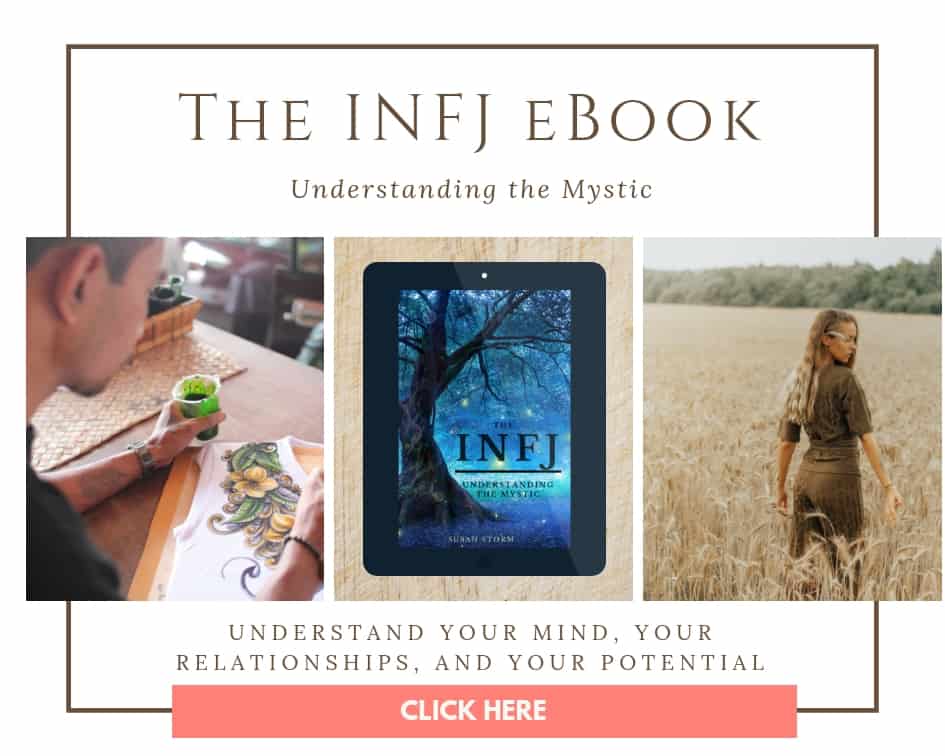




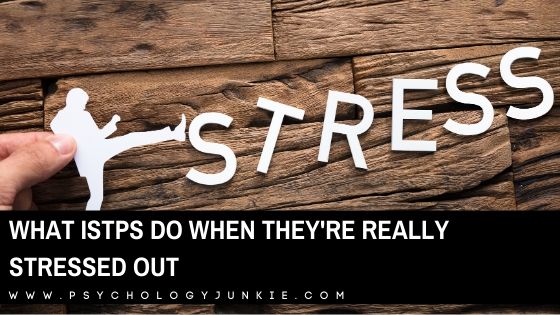

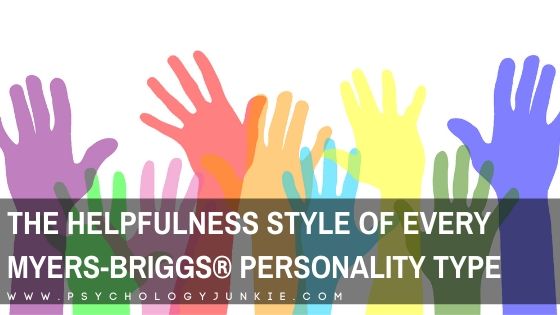

One of the best INFJ resources right here! Thank you!
Results not free, you still have to pay before they send them to you, don’t waste your time unless you’re willing to pay
Hi Cat! I do have a free personality questionnaire. However, I do have ads on my site and sometimes the ads are for other sites with other personality questionnaires. But if you want to take my questionnaire for free it’s here: https://quiz.tryinteract.com/#/5dab0e69919f5e0014ceba9f
im enfp, but i read this to understand better infjs around me. i can’t help but to wonder, when im in a happy mood, im enfp. but when im unhealthy/stressed i become unhealthy and immature infj. its like i have both side, why this can happen?
this was really helpful thank you so much.
Never heard about it before until today. Thanks for the article!
I am INFJ but didn’t know it was rare. I am questioning that part but the rest of the article is interesting and describes everything I’ve ever gone through and am going through now. The panic attacks are the worst and it sometimes takes days to recover (4 this week so far). It really sucks. I am half a century old but only really feel like it when I look in the mirror. I feel conflicted a lot more than I should about a great many things but can’t seem to cope and just want to hide away. I can’t deal with others who are rude and insensitive which adds to the stress I’m dealing with every day. I am trying to move to another place away from rude people which has led me to want to move to another country. As it seems that where I am, no one wants to try to get along and they are just loud and obnoxious for no reason whatsoever, and I live in a smaller town. I’m not even sure why I’m writing all this but the struggle is definitely real for INFJ.
Thank you so much for this! As soon as I read everything about being an INFJ, I was able to understand why I am the way I am. I appreciate this article so much! I realize that I’ve been overly reclusive and I want to get out of this bad wrap and get back in touch with my lighthearted and expressive side. I’m tired of being lonely (not tired of being alone/solitude) and not having anyone special to me. So, again, thank you. 🙂
I feel you too. I wish there were others who truly understood.
Same here! It’s not easy being INFJ. I’m just not designed to be single even though I’ve always independent – typical contradiction
Superb insights as ever. Thank you for seeing and sharing what we INFJs are so eloquently and compassionately. Truly life changing to be seen and understood like this. Please don’t ever stop your great and important work!